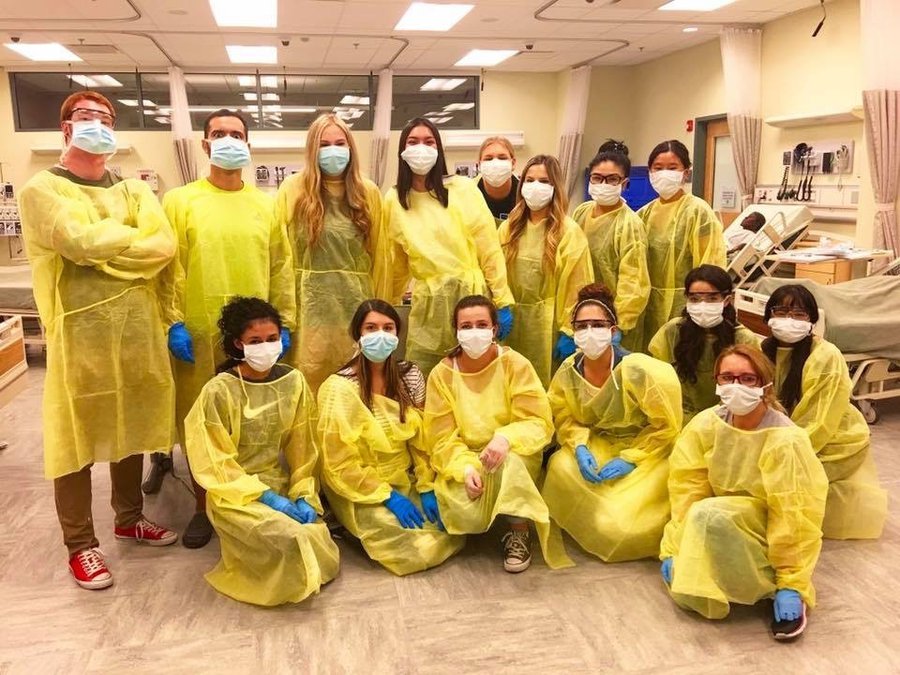A couple of weeks ago, Julia Ramsey was just like any other nursing student at Stanislaus State. Working hard to complete her final semester of school before graduation, she had completed 12 of her 18 clinical shifts at Memorial Medical Center in Modesto that she would need to finish the program. Then, life — and all of her progress — came to a screeching halt.
The effort to curb the spread of COVID-19 has changed daily routines for a majority of Turlock’s residents, including those working toward their nursing degrees at Stanislaus State.
Social distancing and stay at home orders have left many quarantined in their homes, leaving only to perform essential duties. This has led local hospitals to allow only employees who are deemed essential to enter the premises in order to limit the impact of the virus, meaning many nursing students looking to complete their clinical rotations may not be able to do so. Nursing students aren’t allowed into the hospitals to help on the front lines even if they wanted to, and now, they’re wondering if they’ll be able to graduate.
“Everyone is so scared that we worked so hard for four years and may not be able to graduate on time,” Ramsey said. “We understand that they have everybody’s safety in mind and they’re trying to do what’s right, but it feels like this is a problem that’s going to affect all of California.”
Nurses are already hard to come by in the United States, especially in California where experts predict the state could be short nearly 200,000 nurses by the year 2030. Even though already-understaffed hospitals are facing enormous strain due to the coronavirus, the clinical rotations of local students and nursing students throughout the state are being discontinued.
In order to graduate, the California Board of Registered Nursing requires that 75 percent (or 14 of 18 rotations) of a student’s clinical education be completed during hospital rotations, giving them the opportunity to learn from working nurses and interact with patients. The other 25 percent of training comes from online simulations. Ramsey says if that doesn’t change, countless students throughout the state and in Turlock will not enter the workforce in the coming months as they would have originally.
Nursing education leaders in California appealed to the state’s Board of Registered Nursing on Thursday to ease the number of on-site clinical hours required for student nurses to graduate and allow them to complete more hours from simulations instead.
“Only one or two people in my cohort have hit 14 shifts...the Board could potentially lower that threshold and allow us to do more hours online, but if they don’t then we may be delayed a semester,” Ramsey said. “It’s a regulation that’s outside of the school or hospital’s control.”
In 2018, approximately 11,890 nursing students graduated in California and 83 percent entered the workforce that year. There are 30 students in Ramsey’s cohort at Stanislaus State who expected to graduate this May.
“This was so unexpected for all of us, and I definitely think it will have an impact if we’re not able to graduate,” she said. “Those of us who are seniors could even help during this pandemic, but I think the bigger issue here is that we need to graduate so we can continue to have a stream of new nurses who are going to keep departments from being so short staffed.”
Ramsey expected to complete her clinical hours, take her licensure exam and then start a new job as a nurse in the coming months. She recently bought a house and already works over 40 hours a week as an emergency room technician for Emanuel Medical Center in order to pay her bills. Now, she’s unsure when she’ll be able to start her career.
The impact is not only a financial one, but emotional as well.
“It is a very hard major and it’s been a very hard, long four years...my classmates and I have bonded over the years, and to have put so much effort into graduating on time and getting the grades needed has been exhausting. To have to delay that because of something out of our control feels really depressing and disheartening,” Ramsey said. “A lot of us also have gone into this field for the right reasons. We see a need right now and see people stressed and struggling, so a lot of us are really fired up about nursing right now and would love to get out there and be an asset. It’s frustrating that we might not be able to do that when we were so close.”






